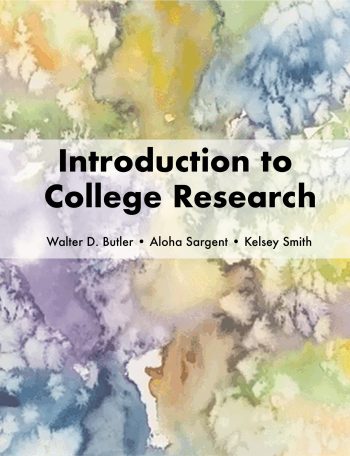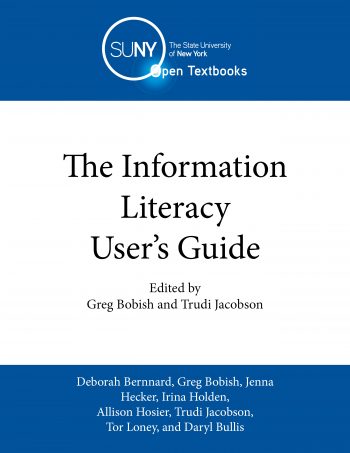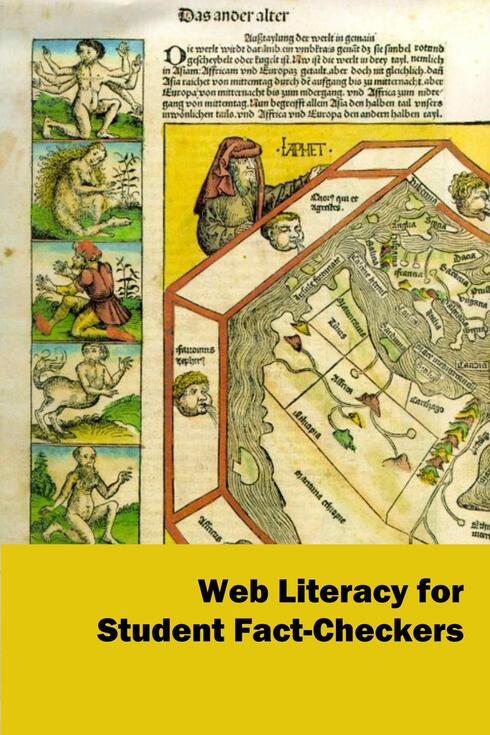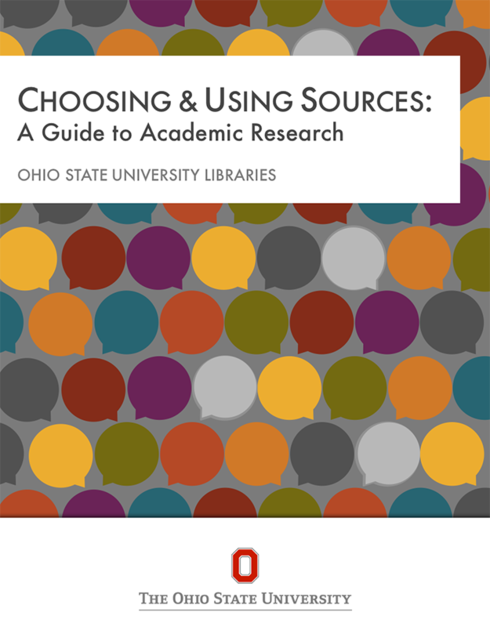Library Research Guides
 Introduction to College Research by Walter D. Butler; Aloha Sargent; and Kelsey Smith (2023)
Introduction to College Research by Walter D. Butler; Aloha Sargent; and Kelsey Smith (2023)
This book acknowledges our changing information landscape, covering key concepts in information literacy to support a research process with intention. We start by critically examining the online environment many of us already engage with every day, looking at algorithms, the attention economy, information disorder and cynicism, information hygiene, and fact-checking. We then move into an exploration of information source types, meaningful research topics, keyword choices, effective search strategies, library resources, Web search considerations, the ethical use of information, and citation.
 Information Literacy: Basic Research Skills by Carol M. Withers (2019): San Diego City College Library
Information Literacy: Basic Research Skills by Carol M. Withers (2019): San Diego City College Library
We all stand on the shoulders of those who came before us. This Open Educational Resource (OER) is nothing if it is not an example of that. I have pulled from years of experience, my many colleagues who may not have realized they were my valued teachers and the work of fellow professionals I have known only through their writings and presentations. The intent of this OER is twofold: to offer a free or low cost quality text to our students in a one-unit information literacy course and to offer a starting place to anyone who wishes to develop their own class or OER. It is intentional that this text is not San Diego City College specific because the skills we teach in our LIBS 101, and are reflected in this OER, are transferable skills. This allows students to take what they learn here and apply it to any information need in any environment: academia, careers, life-long learning, bar bets, or what have you. It is not an attempt to be a comprehensive book on information literacy, but rather a brief overview in support of this one unit class. Assignments and class activities are used to delve deeper into the basic skills presented here.
 Copy(write): Intellectual Property in the Writing Classroom by Martine Rife, Shaun Slattery & Danielle DeVoss (2011):
Copy(write): Intellectual Property in the Writing Classroom by Martine Rife, Shaun Slattery & Danielle DeVoss (2011):
WAC Clearinghouse.
The editors of Copy(write): Intellectual Property in the Writing Classroom bring together stories, theories, and research that can further inform the ways in which we situate and address intellectual property issues in our writing classrooms. The essays in the collection identify and describe a wide range of pedagogical strategies, consider theories, present research, explore approaches, and offer both cautionary tales and local and contextual successes that can further inform the ways in which we situate and address intellectual property issues in our teaching.
 Information Literacy: Research and Collaboration across Disciplines by Barbara J. D'Angelo (2016): WAC
Information Literacy: Research and Collaboration across Disciplines by Barbara J. D'Angelo (2016): WAC
Clearinghouse
This collection brings together scholarship and pedagogy from multiple perspectives and disciplines, offering nuanced and complex perspectives on Information Literacy in the second decade of the 21st century. Taking as a starting point the concerns that prompted the Association of Research Libraries (ACRL) to review the Information Literacy Standards for Higher Education and develop the Framework for Information Literacy for Higher Education (2015), the chapters in this collection consider six frameworks that place students in the role of both consumer and producer of information within today's collaborative information environments. Contributors respond directly or indirectly to the work of the ACRL, providing a bridge between past/current knowledge and the future and advancing the notion that faculty, librarians, administrators, and external stakeholders share responsibility and accountability for the teaching, learning, and research of Information Literacy.
 The Information Literacy User's Guide: An Open, Online Textbook by Deborah Bernnard et al. (2014): Open SUNY.
The Information Literacy User's Guide: An Open, Online Textbook by Deborah Bernnard et al. (2014): Open SUNY.
The Information Literacy User's Guide is based on two current models in information literacy: The 2011 version of The Seven Pillars Model, developed by the Society of College, National and University Libraries in the United Kingdom and the conception of information literacy as a metaliteracy, a model developed by one of this book's authors in conjunction with Thomas Mackey, Dean of the Center for Distance Learning at SUNY Empire State College. These core foundations ensure that the material will be relevant to today's students.
 Web Literacy for Student Fact-Checkers by Mike Caulfield (2017): Mike Caulfield
Web Literacy for Student Fact-Checkers by Mike Caulfield (2017): Mike Caulfield
The web gives us many such strategies and tactics and tools, which, properly used, can get students closer to the truth of a statement or image within seconds. For some reason we have decided not to teach students these specific techniques. As many people have noted, the web is both the largest propaganda machine ever created and the most amazing fact-checking tool ever invented. But if we haven't taught our students those capabilities is it any surprise that propaganda is winning?
This is an unabashedly practical guide for the student fact-checker. It supplements generic information literacy with the specific web-based techniques that can get you closer to the truth on the web more quickly.
 Choosing & Using Sources: A Guide to Academic Research by Cheryl Lowry (2016): Ohio State University Libraries
Choosing & Using Sources: A Guide to Academic Research by Cheryl Lowry (2016): Ohio State University Libraries
Choosing & Using Sources presents a process for academic research and writing, from formulating your research question to selecting good information and using it effectively in your research assignments. Additional chapters cover understanding types of sources, searching for information, and avoiding plagiarism. Each chapter includes self-quizzes and activities to reinforce core concepts and help you apply them. There are also appendices for quick reference on search tools, copyright basics, and fair use.
 The Process of Research Writing by Steven Krause (2007): Steven Krause.
The Process of Research Writing by Steven Krause (2007): Steven Krause.
The title of this book is The Process of Research Writing, and in the nutshell, that is what the book is about. A lot of times, instructors and students tend to separate “thinking,” “researching,” and “writing” into different categories that aren't necessarily very well connected. First you think, then you research, and then you write. The reality is though that the possibilities and process of research writing are more complicated and much richer than that. We think about what it is we want to research and write about, but at the same time, we learn what to think based on our research and our writing. The goal of this book is to guide you through this process of research writing by emphasizing a series of exercises that touch on different and related parts of the research process.


Research Guides by Egan Library | University of Alaska Southeast are licensed under CC BY-SA 4.0